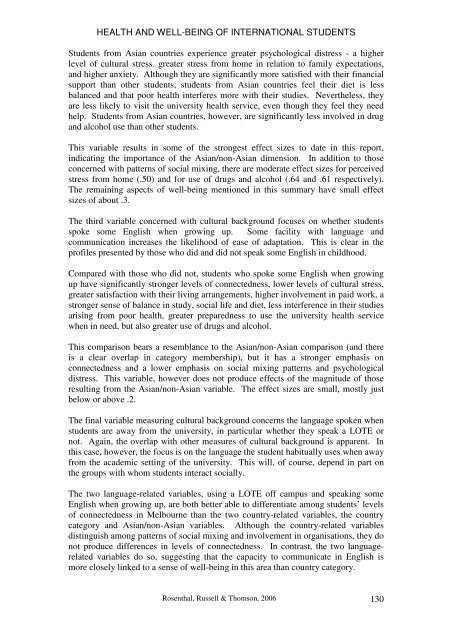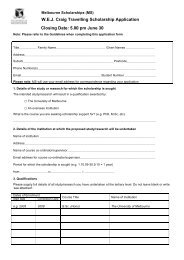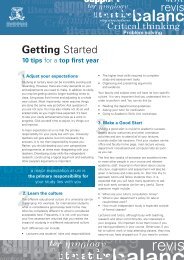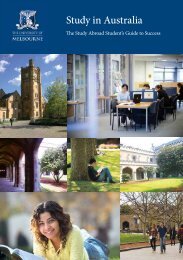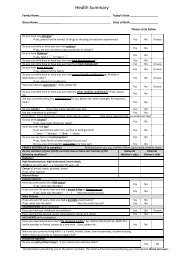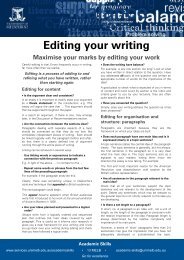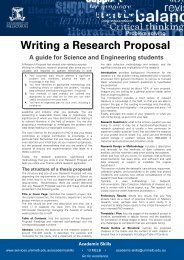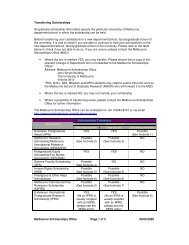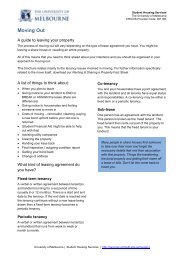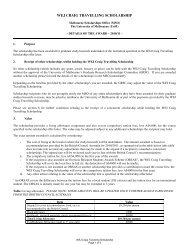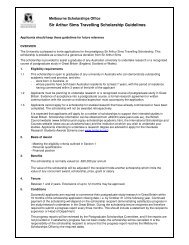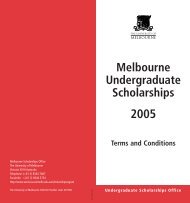a growing experience - Student Services - University of Melbourne
a growing experience - Student Services - University of Melbourne
a growing experience - Student Services - University of Melbourne
You also want an ePaper? Increase the reach of your titles
YUMPU automatically turns print PDFs into web optimized ePapers that Google loves.
HEALTH AND WELL-BEING OF INTERNATIONAL STUDENTS<strong>Student</strong>s from Asian countries <strong>experience</strong> greater psychological distress - a higherlevel <strong>of</strong> cultural stress, greater stress from home in relation to family expectations,and higher anxiety. Although they are significantly more satisfied with their financialsupport than other students, students from Asian countries feel their diet is lessbalanced and that poor health interferes more with their studies. Nevertheless, theyare less likely to visit the university health service, even though they feel they needhelp. <strong>Student</strong>s from Asian countries, however, are significantly less involved in drugand alcohol use than other students.This variable results in some <strong>of</strong> the strongest effect sizes to date in this report,indicating the importance <strong>of</strong> the Asian/non-Asian dimension. In addition to thoseconcerned with patterns <strong>of</strong> social mixing, there are moderate effect sizes for perceivedstress from home (.50) and for use <strong>of</strong> drugs and alcohol (.64 and .61 respectively).The remaining aspects <strong>of</strong> well-being mentioned in this summary have small effectsizes <strong>of</strong> about .3.The third variable concerned with cultural background focuses on whether studentsspoke some English when <strong>growing</strong> up. Some facility with language andcommunication increases the likelihood <strong>of</strong> ease <strong>of</strong> adaptation. This is clear in thepr<strong>of</strong>iles presented by those who did and did not speak some English in childhood.Compared with those who did not, students who spoke some English when <strong>growing</strong>up have significantly stronger levels <strong>of</strong> connectedness, lower levels <strong>of</strong> cultural stress,greater satisfaction with their living arrangements, higher involvement in paid work, astronger sense <strong>of</strong> balance in study, social life and diet, less interference in their studiesarising from poor health, greater preparedness to use the university health servicewhen in need, but also greater use <strong>of</strong> drugs and alcohol.This comparison bears a resemblance to the Asian/non-Asian comparison (and thereis a clear overlap in category membership), but it has a stronger emphasis onconnectedness and a lower emphasis on social mixing patterns and psychologicaldistress. This variable, however does not produce effects <strong>of</strong> the magnitude <strong>of</strong> thoseresulting from the Asian/non-Asian variable. The effect sizes are small, mostly justbelow or above .2.The final variable measuring cultural background concerns the language spoken whenstudents are away from the university, in particular whether they speak a LOTE ornot. Again, the overlap with other measures <strong>of</strong> cultural background is apparent. Inthis case, however, the focus is on the language the student habitually uses when awayfrom the academic setting <strong>of</strong> the university. This will, <strong>of</strong> course, depend in part onthe groups with whom students interact socially.The two language-related variables, using a LOTE <strong>of</strong>f campus and speaking someEnglish when <strong>growing</strong> up, are both better able to differentiate among students’ levels<strong>of</strong> connectedness in <strong>Melbourne</strong> than the two country-related variables, the countrycategory and Asian/non-Asian variables. Although the country-related variablesdistinguish among patterns <strong>of</strong> social mixing and involvement in organisations, they donot produce differences in levels <strong>of</strong> connectedness. In contrast, the two languagerelatedvariables do so, suggesting that the capacity to communicate in English ismore closely linked to a sense <strong>of</strong> well-being in this area than country category.Rosenthal, Russell & Thomson, 2006 130


